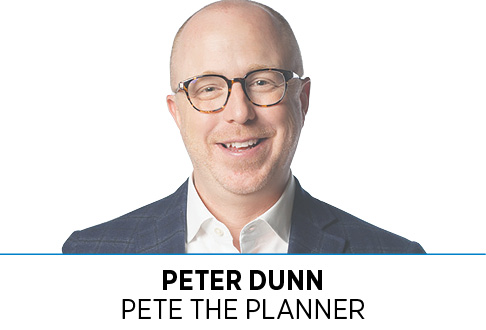Subscriber Benefit
As a subscriber you can listen to articles at work, in the car, or while you work out. Subscribe Now Like you, my heart was breaking for each image and story that emanated from Southern California last week. I found myself vicariously terrified and hopeless. I kept trying to place myself in the shoes of the evacuees as they were forced to make high-stakes decisions, all while praying their insurance is what they thought it was.
Like you, my heart was breaking for each image and story that emanated from Southern California last week. I found myself vicariously terrified and hopeless. I kept trying to place myself in the shoes of the evacuees as they were forced to make high-stakes decisions, all while praying their insurance is what they thought it was.
Whereas I’m not anticipating a life of dodging wildfires here in the Midwest, it’s not too far-fetched to imagine other disasters impacting my ability to live the life I’ve dreamed of living. So with that idea, and my promise to not marginalize the pain of our fellow Americans, I want to explore what there is to learn from this disaster.
◗ The importance of emergency funds
Wildfires strike suddenly, leaving little time to prepare. Thousands of people are forced to evacuate with only the essentials, and returning home to assess the damage can reveal catastrophic losses. For those without an emergency fund, such events can quickly spiral into financial ruin.
An emergency fund won’t prevent disaster, but it can mitigate the immediate financial blow. Ideally, this fund should cover three to six months’ worth of essential expenses. For example, if you’re displaced and need temporary housing, an emergency fund can cover hotel bills, food and transportation without relying on high-interest debt. Start small if necessary, but be consistent in building this safety net.
◗ Insurance: Coverage is king
One of the most critical lessons from wildfire survivors is the necessity of comprehensive insurance. Many homeowners discover, too late, that their policies don’t adequately cover wildfire damage. Others might lack renters’ insurance, leaving them to replace all their possessions out of pocket.
When was the last time you actually read your insurance policy? Ensure your homeowners or renters insurance includes coverage for natural disasters common in your area, such as wildfires or, in our case, tornados. Pay attention to the details: Does your policy provide replacement-cost coverage or actual cash value? The former ensures you can replace lost items at today’s prices, while the latter factors in depreciation. Consider additional coverage for high-value items like jewelry, electronics or art.
Don’t forget about auto insurance. Vehicles are often damaged or destroyed in natural disasters, and comprehensive auto insurance is what protects you in these scenarios. Ensure you’re adequately covered so you’re not left scrambling for transportation when you need it most.
◗ The role of financial records
Imagine you’ve been forced to evacuate your home. In the chaos, vital financial documents—tax returns, insurance policies or property deeds—might be left behind or destroyed. Replacing these documents can be time-consuming and stressful, particularly when you’re already dealing with disaster recovery.
Backing up your financial documents digitally is crucial—think cloud storage or a secure external hard drive. Keep a grab-and-go file with physical copies of your most critical records in case you need to leave in a hurry. Organizing your financial paperwork before disaster strikes ensures you’re ready for whatever comes your way.
◗ Evacuation costs and planning
Evacuating from a wildfire can come with significant costs. Gas, food, lodging and other expenses add up quickly, especially for prolonged evacuations. Many people overlook these costs when budgeting or planning for emergencies.
To prepare, consider creating a specific evacuation fund. Even a few hundred dollars earmarked for these expenses can make a stressful situation slightly more manageable. Additionally, having a well-thought-out evacuation plan, including prearranged accommodations with friends or family, can reduce both financial and emotional strain.
◗ Community and resilience
One of the silver linings of any disaster is witnessing communities come together to support one another. Mutual aid networks, fundraisers and charitable organizations often step in to help those affected by wildfires.
This underscores the importance of community in personal finance. Having a solid community of neighbors, friends and family can offer a safety net that money simply can’t buy. Whether it’s a place to stay, a shared meal or emotional support, these connections are invaluable during times of crisis. Beyond immediate assistance, community relationships can also open doors to resources and opportunities that aid long-term recovery.
◗ Long-term preparedness
Wildfires aren’t just a one-time event; they’re an ongoing risk for many Californians. Similarly, personal finance isn’t a one-time fix but an ongoing practice. Just as fire-prone communities invest in mitigation strategies like defensible space and fire-resistant building materials, individuals should adopt long-term financial habits to withstand future challenges.
◗ Hope amid the ashes
Wildfires are a poignant reminder that control is often an illusion. But while we can’t prevent all disasters, we can take steps to control how we respond to them. Financial preparedness is not just about dollars and cents; it’s about creating stability in an unstable world.
Do you have an emergency fund? Is your insurance adequate? Are your financial records secure and accessible? The lessons from those who have lived through wildfires are written in both the ashes of loss and the resilience of recovery. Learn from their experiences, and build a financial foundation that can withstand life’s inevitable challenges.•
__________
Dunn is CEO of Your Money Line powered by Pete the Planner, an employee-benefit organization focused on solving employees’ financial challenges. Email your financial questions to [email protected].
Please enable JavaScript to view this content.
